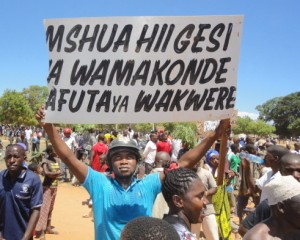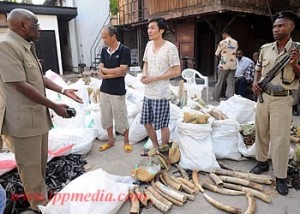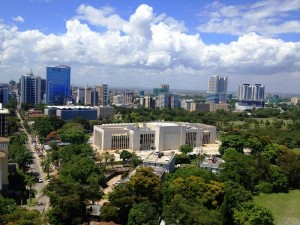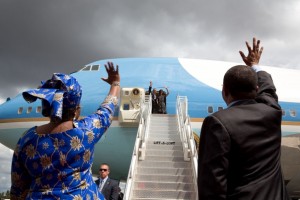Dennis Rodman outburst (a fumble like UncleRuckus one & two) on CNN drew both criticisms and laughs. Rodman being Rodman wasn’t going to let TV chit-chatters give him an upset stomach and prevent him from grabbing yet another rebound. Rodman stood firm on his stance (until he sobered up), friendship over patriotism – at least thats what his few minutes of beep-beep seemed to imply. Rodmans’ decision is what we would call maamuzi magumu, a type of Kool-Aid that we all need to start drinking – country before friendship(s).
 Zachariah Mampilly’s narrative makes a compelling argument for the people of Mtwara on how, for decades, they have let the country’s interests transcend their own interests. Despite their sacrifices, these Southern people have been called names such as “illiterate and backwards” by politicians and intellectuals alike. However, the name calling says a lot more about the name callers than those being called. This characterization of our fellow Tanzanians as “illiterate” by the know-it all intellectuals is an example of our very own kind of White Savior Industrial Complex.
Zachariah Mampilly’s narrative makes a compelling argument for the people of Mtwara on how, for decades, they have let the country’s interests transcend their own interests. Despite their sacrifices, these Southern people have been called names such as “illiterate and backwards” by politicians and intellectuals alike. However, the name calling says a lot more about the name callers than those being called. This characterization of our fellow Tanzanians as “illiterate” by the know-it all intellectuals is an example of our very own kind of White Savior Industrial Complex.
When President Jakaya Kikwete delivered his much celebrated speech on history of the liberation during Nelson Mandelas funeral, he talked of Tanzania’s involvement in decolonizing Africa. The President (fair to assume) was referring to the sacrifices like those that were made by the Southern regions of Tanzania. However, earlier in his “angry speech to Parliament, President Jakaya Kikwete denounced the protesters”, probably under the same presumption that their behavior was based on “emotion not logic”. I agree with the President though, that “natural resources, regardless of the region where they are found, are the property of all Tanzanians”. Unfortunately, when “jobs never materialize in your village” and “everyone wants a piece of your land but have little in peace of your people”, this “property of all” speech, begins to sound like dear old W. spreading democracy.
Moreover, the “emotion not logic” argument is always a dangerous one, especially for politicians because part of their bread and butter depends on preying (not all and not always) on voters emotions for either votes or sympathy once they’re caught dipping their hands inside the honey jar. But when all fails, threat(s) or violence is the stick that is usually used to break the camel’s back. The army being unleashed onto the people of Mtwara is one example. The human rights violations that were committed against the wananchi during Operation Tokomeza could be another. But if protesting against the construction of a gas pipeline is seen as “threat to prosperity”, then what about the poachers and the fat-cats behind them? Is there a railway track being built, not of steel but elephant tusks heading Far East, that we’re unaware of? And the drug kingpins and their mules, are they not a threat to national security as well?

The Southerners may successfully be dismissed as being emotional, “illiterate and backwards” to distract the attention away from the widespread inequality that continues to widen the gap between the haves and the have-nots. For example, regions with gold mines, has the Government done enough to assure that the locals and the “small scale or artisan” miners reap the benefits? Most plots that these small-scale miners work on are “controlled by a local director and financed by an exterior investor”. With “distinct lack of regulation in this sector communities are exposed to exploitation, dangerous working conditions and further marginalization” (more from Tony J. Spence’s report here).
In such unregulated environment(s), the foreign investor and his director can operate with impunity. “In most cases the director takes the money, but does not give back the money he has promised us. The directors have many excuses not to pay us properly, they can blame it on the exchange rate, or lie about the amount of gold”, 28 year old Emmanuel explains. For the people of Mtwara, who heavily depend on cashew nuts for income, the exploitation happening to the mining communities can happen to them as well with their new wealth (gas) and completely deplete their new found hope. Tony J. Spence’s article goes on to reveal that it is not uncommon for mine investors “to demonstrate no interest in providing investment for the development of the area they operate within”. Now with the gas soon en routing to Dar, their skepticism is logical not emotional.
Spence, through his article on mining, may have also further explained why people of Mtwara may actually be quite knowledgeable on how capitalism functions. Spence explains: “unfair structure established by the unchecked power of its private owners constitutes a vastly unequal distribution of wealth”. Further: “income will not trickle-down to the most poor and marginalized”. One man’s “prosperity”, is another man’s “cyanide”.
But also, some may argue that, fighting with the system that is run by a party which is “venal” with MP’s that are “leeches” and national bosses that are “worse” is a problem within itself. Mr. Lyimo and his fellow villagers from Kilimanjaro region ploughed their road by their own initiative. A great example of “ask not what your country can do for you; ask what you can do for your country”, nonetheless this should not excuse the government from its responsibilities. There is visible contrast between the Southern regions and those in the north like Kilimanjaro in terms of development. While Mtwara still bears the scars of war with the Portuguese, Kilimanjaro prides itself with breath taking views, like Mt. Kilimanjaro which tourists flock to see and climb.
Like the rest of Africa, Tanzania is on “the road to the top”. For evidence of this rising continent, look no farther than KFC that is targeting “Africa’s surging middle class, which is expanding both in numbers and weight”. Thanks to the afropolitans who embrace “fast food, which often costs more than street food or other local fare, as a status symbol”. Status symbol indeed, but this idea of Africa rising is questionable, leaving some people like Jacques Enaudeau still “in search of the African middle class” and for a good reason. This enthusiasm of Africa’s surging middle class seems to intentionally or unintentionally forget to mention if the lower class is shrinking or not as the result of this surge. Trying to explain this concept of Africa rising to people like Emmanuel or the local Imam in Mtwara would be like “explaining white privilege to a broke white person”.

As we prepare to head to the polls in 2015 to elect our 5th President since Independence, its clear the song has changed and will continue to do so, but not everyone, I fear, has learned the new moves. Mwalimu Nyerere’s long walk after independence did have its shortcomings, the program of villagization being a prime example. There are still critics of his ujamaa programs, who need to also look at how Jeffery Sachs’ well funded idea of millennial villages turned out.
I and the “born frees” of this country will never know exactly how Tanzania under Nyerere was like, but I know enough to know that the ujamaa era was not a cake walk. On the contrary, for Tanzania to think “walking in” elegant shoes across the regional and international stage is going to be enough to seduce prosperity is being naïve, just like thinking that investors are Babu wa Samunge. But what do I know about walking barefoot and walking in heels. Maybe it is better to end up in a bodaboda ward in Muhimbili from falling off of 6 inch heels than walking barefoot and have a needle stuck up your foot.

In the end, if people continue to be marginalized, we’ll sooner than later come to realize that the joke is more on us and less on them (the Mtwara citizens). The joke is simple: Not or casually addressing the political, economical and social problems is in itself, “illiterate and backwards”. After all, maybe the joke is on me as well. Judging by some of our leaders bloated pockets and bellies, the question should be, is there any Kool-Aid left? And with the opposition parties stumbling all over the place, who will keep the government in check? Maybe we should start thinking about investing on our own Edward Snowden.
Further readings:
- Are there “less confrontational tactics than mass protests”, certainly.
- African urban fantasies: dreams or nightmares?
- From Kigamboni, Nairobi, Kigali all the way to Lagos

